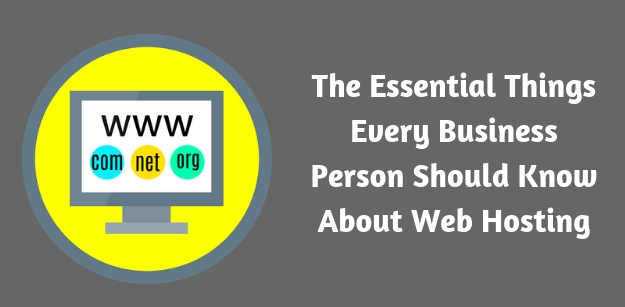The business world has come a long way since the advent of the internet. There are more business opportunities. Businesses can reach a global audience without needing to set up branches in various countries. And some businesses can operate solely online.


Your business may already be a success. That, however, doesn’t mean it cannot benefit from the web. Those businesses on the frontline must keep evolving to remain successful. This, in one way, implies that a successful business has to take advantage of the opportunities on the web in order to remain competitive and to keep thriving.
To establish your business online, you need a website, and to set up a website, you need to take out a web hosting service. This article was tailored to give you an overview of things every business person ought to know about web hosting.
What Is Web Hosting?
A web hosting service does something similar to what your personal computer does. You store files on your PC and when you need to access a file, you simply open Windows Explorer, locate the file, and open it.
In the case of a web hosting service, you rent an external server or a portion of it from web hosting companies, where you store the files that make up your website for public use. So, when visitors open your web pages, they are basically requesting access to your public files from that external server.
Web hosting is also similar to hosting a feast where you invite guests over to a venue to eat and drink. Except that, in this case, the venue is managed by your web hosting provider, the address of that venue is your domain, and instead of ‘food and drinks’ you are serving your site visitors files they request.
AccuWeb Hosting provides low-price web hosting services with high security.


Why Can’t You Host Your Website on Your Computer?
You actually can. Except that a PC or MAC doesn’t have the capacity to serve many users at the same time. Apart from the fact that your PC will need a very powerful internet connection and must be turned on at all times, you have to also consider how long it takes it to open a single program. Then try opening numerous programs or files at the same time and see what happens. If you get the feeling that your computer is going to crash, and then waits until outsiders start making http requests from the internet.
The bottom line is that:
● While your PC may not have enough disk space and RAM to store and run your web files and software, the servers web hosting companies provide can offer you as much disk space and RAM as your website needs.
● Your PC doesn’t have the bandwidth to handle web traffic, but a hosting provider can offer your site ample bandwidth to manage any amount of traffic it receives. Bandwidth, by the way, is the highest amount of data that can be transferred in and out of your web server at any given time, and it is one of the aspects of web hosting that controls your site’s speed.
Web servers can offer you so much more because they are more powerful computers with much stronger connections to the internet. What’s more, using a web hosting service can spare you the technicalities of managing your own server and connecting your domain name to your website (many web hosting providers are also domain registrars).
What Are Your Web Hosting Options?
Depending on the content type associated with your business, the amount of traffic you expect to your website, your budget, and how much control you want over your web server, you can choose any one of the four types of web hosting.
Here they are:
Shared Hosting
With this hosting type, your website shares the same web server and its resources (CPU and RAM) with other websites. This is the ideal hosting type to go for if you are on a small budget, expect moderate traffic to your site, and don’t have the technical skills to run a more complicated package. While the shared hosting type is cheap and used by most websites, you won’t get root access to the web server, the performance of your website can be hampered by other sites you share the server with, and your site will have restricted ability to manage traffic spikes.
Virtual Private Server (VPS) Hosting
With this type of hosting, you step a bit away from shared hosting. Your server, in this case, is simply a virtual dedicated server or, perhaps, a well-partitioned shared server. This means that you share the same server with a group of other websites, except that this time you have a portion of the server’s resources dedicated to your website.
You get more security and, possibly, root access to your virtual server, and better ability to manage traffic spikes. However, this type of hosting is a tad costlier than shared hosting.
Dedicated Server Hosting
With this hosting type, you rent a web server for your website and don’t share its resources with any other site. While this is perhaps the costliest type of web hosting, it offers you maximum control over your server. You can install your own software, tweak the operating system and configurations, and get optimum performance.
This is the ideal web hosting type to go for if you expect much traffic to your website and have the financial and IT resources to manage the server. There is, however, the possibility that your website will run way below the capacity of your server—thus you end up paying for more resources than you use.
Cloud Hosting
With Cloud hosting, a group of servers combine their resources to host your website. This is more like the Virtual Private Server hosting, except that in this case your website isn’t sharing a server with other websites, but rather is sharing the resources of a group of servers with those other websites.
Cloud hosting virtually offers the bests of other hosting types. You only pay for the server resources (disk space and bandwidth) you use. And when your hosting plan is scalable, you get more resources as traffic to your website grows. This means you don’t have to worry about losing customers or sales due to inadequate bandwidth.
Now that you know which hosting type to select for your website, here are other things to consider when taking out a web hosting service:
● The uptime score of your hosting provider. Make sure it’s at least 99.9%.
● Does your hosting plan come with 24/7 technical support? It should.
● Your hosting platform should be compatible with WordPress.
● Does your hosting plan have ecommerce features and other add-ons?
● Does it come with a free domain?
● Does it also come with a free personalised email?
● Is it Scalable
● Is your host an original provider or a reseller?
● Does your hosting provider have proper security and backup protocols in place?
● Who will be responsible for managing your server? You or your host? This is an essential question if you want to go for a dedicated hosting environment.
● Does the hosting provider have a trial period and refund policy?
Apart from taking out a web hosting service, there are numerous other things involved in setting up your business website—like hiring a web designer to design your website and enlisting the help of a content writer who can fill your website with great content.
Your journey to establishing an online presence for your business doesn’t end there. You also have to open social media accounts for your company, connect them to your website, and work towards driving traffic to your site so that you can begin converting new customers and making more sales.



